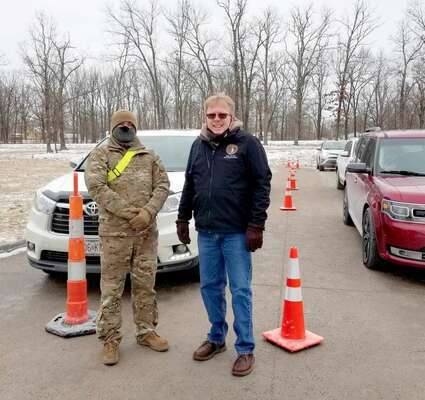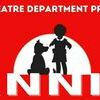Mike McGirl - News From The Capitol
 Rep. mike mcgirl visited with the National Guard and the support staff at the Vaccination Clinic held at the W.C. Ambulance District recently. (Submitted Photo)
Rep. mike mcgirl visited with the National Guard and the support staff at the Vaccination Clinic held at the W.C. Ambulance District recently. (Submitted Photo)
One of my top legislative priorities, and also one of the issues most important to my constituents, is the right to bear arms. The second amendment, especially in light of an anti-gun President and Congress, is once again in jeopardy. In addition to passing pro-gun legislation such as the Second Amendment Preservation Act, I support organizations working every day to preserve our constitutional rights, so it was an honor to attend the NRA Foundation banquet on Friday night. I was encouraged by the large crowd and was inspired after visiting with so many friends and neighbors who support our freedoms.
House Approves License Reciprocity for Skilled Veterans
This week the members of the Missouri House continued their efforts to make Missouri an attractive location for military members and their families to live and work. The House advanced a piece of legislation that will allow veterans to use the skills they obtained in the military to more easily find jobs in the private sector.
The legislation builds on the efforts made by the legislature in 2020 to allow professionals to move to Missouri and to continue working in their professions without delay. HB 2046 set up a universal license recognition system that allows professionals licensed in other states to come to Missouri and enter the workforce. HBs 1511 & 1452 removed the barriers that impede military spouse licensure and allows them to practice their occupation as long as they hold a valid current license issued by another state or territory of the United States.
While the bills approved last year made significant stride in removing barriers for skilled professionals, the sponsor of this year’s bill said his visits to military bases across the state revealed there was another issue to address. He said military officials told him that “as they try and help veterans reintegrate back into the private sector, it can be very challenging for them to do that quickly and easily, and to take all that good training they had in the military and apply it to the private sector.”
The sponsor said his bill will allow skilled veterans to “quickly and easily obtain a license and immediately plug into our state economy here and become productive citizens of the state.” Specifically, the legislation would include a Military Occupational Specialty as a type of licensure when applying for licensure in Missouri in the same occupation under Missouri's Reciprocity Laws. In effect, it would treat military occupation specialties the same as an out-of-state license. Licensing boards in Missouri could still limit the scope of a license provided through the bill if the training and professional requirements are different between the military and civilian positions.
The bill now moves to the Senate for consideration.
House Approves Bill to Improve Local Government Transparency
Legislation that is now on its way to the Senate would create a database that allows taxpayers to search expenditures and payments received and made by counties and municipalities. The bill would create the Missouri Local Government Expenditure Database, which would be an easy to use, downloadable database housed on the Missouri Accountability Portal.
The bill is meant to improve transparency by providing public access to local government expenditure data. The database would be maintained by the Office of Administration and would include extensive information about a given municipality's or county's expenditures and the vendors to whom payments were made.
The sponsor of the bill said the database will be beneficial to taxpayers who can see how their dollars are spent, but will also provide benefits to municipalities. He said, “I think it’s really a beneficial thing for the cities in the long run to do this because they’re going to find out that they’re going to be able to use that information to their advantage to help make the city or the county more effective.”
A municipality or county may voluntarily participate in the database, or may be required to participate through a petition process used by its residents. The database would provide expenditure data for each fiscal year beginning on or after December 31, 2022.
Legislation Approved to Protect Information of Private Citizens
A bill approved by the House this week would allow public governmental bodies to protect certain information shared by private citizens. The bill is meant to prevent individuals and organizations from obtaining contact information of members of the public to use for their own purposes such as political campaigning.
When a public governmental body receives email addresses and telephone numbers submitted by individuals for the sole purpose of receiving electronic or other communications, the bill allows the body to close the records. The bill also allows a public governmental body to close records of utility usage and bill records for customers of public utilities unless the customer requests them or authorizes their release. Additionally, the bill allows a public governmental body to close records related to security and evacuation procedures, including software or surveillance companies that secure the building, for public governmental property.
The bill now moves to the Senate for consideration.
Utility Assistance for Low-Income Missourians Expanded
Missourians struggling with their heating bill because of the extreme cold will now have additional help. Gov. Mike Parson recently announced the state’s Energy Crisis Intervention Program will offer improved assistance to eligible low-income Missourians.
The Energy Crisis Prevention Program, which is part of the Low-Income Home Energy Assistance Program (LIHEAP), assists households when their energy source has been shut off or is at risk of disconnection. The program pays the minimum amount needed on the fuel bill to get the household out of crisis. However, starting this winter, the program will pledge the maximum disconnect amount (up to $800) toward an eligible participant’s owed balance.
Parson said about the improvement to the program, “Since many Missourians remain in crisis for subsequent months, paying only the minimum to keep a low-income household out of crisis tends to prolong the situation. Now, we can make it faster and easier to resolve a household’s crisis situation.”
In FY2020, Missouri provided $78.6 million in LIHEAP assistance to over 108,000 households. In addition to meeting the income criteria, low-income Missourians must also meet the following criteria to be eligible for winter heating assistance through LIHEAP:
• Be responsible for paying home heating costs,
• Have $3,000 or less in bank accounts, retirement accounts, or investments, and
• Be a U.S. citizen or legally admitted for permanent residence.
It is very important for low-income Missourians who have received a disconnect notice or know a disconnect notice is coming to get help now to prevent service disconnection at a later date. To learn more about the LIHEAP program, visit https://mydss.mo.gov/energy-assistance.
I welcome your ideas, questions and concerns. You may contact me at the State Capitol as follows: (573) 751-2398 or by email: mike.mcgirl@house.mo.gov or by writing to Rep. Mike McGirl, 201 W. Capitol Ave., Room 201-A, Jefferson City, Mo. 65101.
Please support The Independent-Journal by subscribing today!
